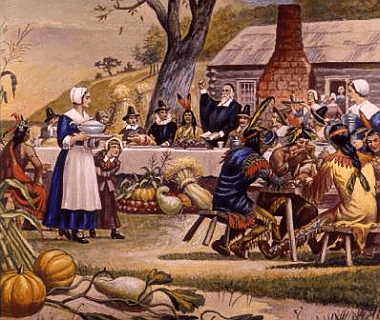This story tells a very specific and flattering part of the history of early America. It leaves out the earlier Thanksgiving celebrations in the Virginia colonies — those colonies being guided by commercial gain not religious enlightenment — and the history of slavery and armed conflict with America’s indigenous population. But historical accuracy is not the standard that we measure the Thanksgiving story against. It is the feeling of Thanksgiving, the kind of attitude about ourselves, our families, and our nation, that is important. The Thanksgiving story as we tell it describes us as a country founded in peace and goodwill — not in theft, slavery, and genocide. It’s the story of how we want to see ourselves and our past — and, sometimes, it’s the kind of story that inspires the best in us, instead of justifying the worst. Each of us tells ourselves stories about ourselves and our lives, sometimes to inspire ourselves to great heights, and other times to justify our failures. This Thanksgiving, instead of thinking only about what I’m thankful for (though that’s important, too), I wanted to think about the kinds of stories I’ve told myself, or about myself, over the past year. I’ve talked before about how stories are powerful ways of encapsulating and passing on information — but they do more than that. Stories give shape to and direct emotion, passion, and behavior. They help us to grapple with experience and extract meaning from it. So, for instance, when my step-children’s father started behaving terribly towards his children, for no clear reason we could make out, my partner and I told the story to each other over and over in some attempt both to understand and to decide how to respond. The stories we tell ourselves can motivate us to excel or to try something new. For years, I have told myself a story of academic life and of myself in it. In the gap between the story I imagined and the life I led lay all the steps I needed to take to make the story real, and it is that which has kept me motivated at a job that can be, at times, overwhelming. Part of that story was about my unique grasp of Internet technology as an instructional tool, which has motivated me to include blogging and online research in the design of my classes — earning me a great deal of attention from my colleagues and my department. But stories can also be deceptive, causing us to fall short of our goals. I have always intended to write for an audience outside of academia, but for years I have told myself that I had to pay my dues as an educator and a researcher before I could take up writing professionally. This year, I realized that it was not my academic situation, nor my economic situation, that was preventing me from becoming a writer — that it was in fact the story I was telling myself. So I stopped telling myself that story, and started telling myself the story where I’m a writer — and within months had begun writing at lifehack, as well as sending out submissions to several magazines. These are only a few examples; I’m sure we tell ourselves dozens of stories about ourselves as lovers and partners, parents and sons or daughters, employees or employers, artists and amateurs. Often when we worry or back away from challenges, it is because in the stories we tell ourselves we are not good enough to deal with them, or just not the kind of person that deals with them. “I’m no hero,” we tell ourselves, and shy away from situations that demand heroism of us. Other times we charge headlong into risky situations because in our stories, we can and do handle them — in our stories, there is no risk. I wonder how easy it is to change our stories? It occurs to me that traditional psychoanalysis and therapy is based on telling your stories to a trained listener, who gently guides you through the process of developing new stories about yourself. Perhaps for the most deeply-held stories, professional intervention is needed, but what about the casual stories, the little tales of personal imperfection and unfulfillable desire that subtly shape our daily lives? I think we can re-tell these stories — we humans are innately creative and creating new stories comes naturally to us. The catch is that to revise the stories of our lives means closely examining — proofreading, if you will — the stories we already tell ourselves, and that kind of self-examination is hard to come by. But as we face a long weekend committed to the telling of stories — both national and familial — maybe we can commit ourselves to examining at least some of our personal stories and considering how we might tell better ones. That would be something to be thankful for, indeed!
